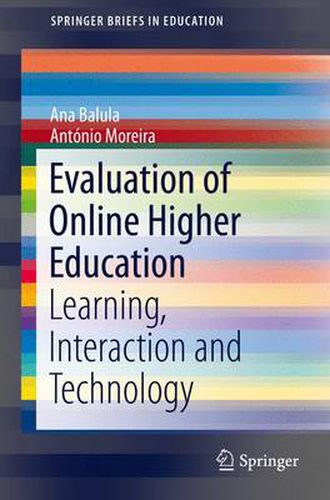Readings Newsletter
Become a Readings Member to make your shopping experience even easier.
Sign in or sign up for free!
You’re not far away from qualifying for FREE standard shipping within Australia
You’ve qualified for FREE standard shipping within Australia
The cart is loading…






This title is printed to order. This book may have been self-published. If so, we cannot guarantee the quality of the content. In the main most books will have gone through the editing process however some may not. We therefore suggest that you be aware of this before ordering this book. If in doubt check either the author or publisher’s details as we are unable to accept any returns unless they are faulty. Please contact us if you have any questions.
The work presents a theoretical framework for the evaluation of e-Teaching that aims at positioning the online activities designed and developed by the teacher as to the Learning, Interaction and Technology Dimensions.
The theoretical research that underlies the study was developed reflecting current thinking on the promotion of quality of teaching and of the integration of information and communication tools into the curriculum in Higher Education (HE), i.e., bearing in mind some European guidelines and policies on this subject. This way, an answer was sought to be given to one of the aims put forward in this study, namely to contribute towards the development of a conceptual framework to support research on evaluation of e-teaching in the context of HE. Based on the theoretical research carried out, an evaluation tool (SCAI) was designed, which integrates the two questionnaires developed to collect the teachers’ and the students’ perceptions regarding the development of e-activities. Consequently, an empirical study was structured and carried out, allowing SCAI tool to be tested and validated in real cases. From the comparison of the theoretical framework established and the analysis of the data obtained, we found that the differences in teaching should be valued and seen as assets by HE institutions rather than annihilated in a globalizing perspective.
$9.00 standard shipping within Australia
FREE standard shipping within Australia for orders over $100.00
Express & International shipping calculated at checkout
This title is printed to order. This book may have been self-published. If so, we cannot guarantee the quality of the content. In the main most books will have gone through the editing process however some may not. We therefore suggest that you be aware of this before ordering this book. If in doubt check either the author or publisher’s details as we are unable to accept any returns unless they are faulty. Please contact us if you have any questions.
The work presents a theoretical framework for the evaluation of e-Teaching that aims at positioning the online activities designed and developed by the teacher as to the Learning, Interaction and Technology Dimensions.
The theoretical research that underlies the study was developed reflecting current thinking on the promotion of quality of teaching and of the integration of information and communication tools into the curriculum in Higher Education (HE), i.e., bearing in mind some European guidelines and policies on this subject. This way, an answer was sought to be given to one of the aims put forward in this study, namely to contribute towards the development of a conceptual framework to support research on evaluation of e-teaching in the context of HE. Based on the theoretical research carried out, an evaluation tool (SCAI) was designed, which integrates the two questionnaires developed to collect the teachers’ and the students’ perceptions regarding the development of e-activities. Consequently, an empirical study was structured and carried out, allowing SCAI tool to be tested and validated in real cases. From the comparison of the theoretical framework established and the analysis of the data obtained, we found that the differences in teaching should be valued and seen as assets by HE institutions rather than annihilated in a globalizing perspective.